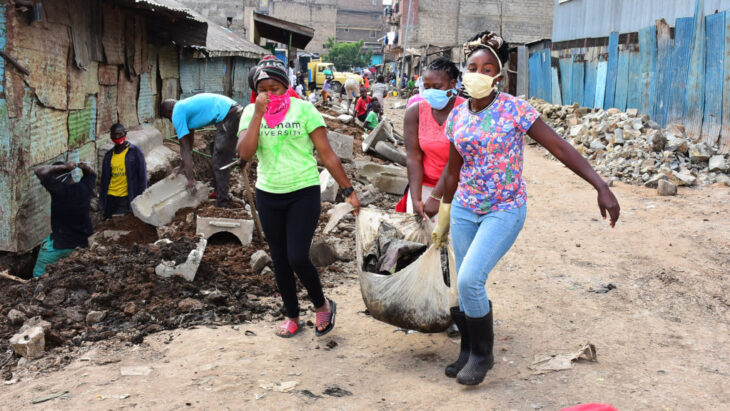NAIROBI,Kenya, Jun, 14 – Transport cabinet secretary James Macharia has issued a status update on the Kazi Mitanni program launched by president Uhuru Kenyatta at the onset of the COVID-19 pandemic in 2020.
Macharia also sought to clarify issues around the remuneration of workers while revealing that the program will be sustained for the next three months.
“The activities of the program will therefore be covering three months. Additionally, in this third phase, the program will expand its reach to cater for 533,608 youth and move into all wards across the country,” he said in a statement
It is worthing noting that despite the president’s pledge to allocate Sh10 billion for the programme this time round, only Sh2.5 billion was allocated to the program by the national assembly.
The National Steering Committee of the Kazi Mtaani Program brings together the State Department of Housing and Urban Development, the State Department of Interior & Coordination of National Government, as well as other participating Government agencies.
“As a result, in the third phase, only 50 per cent of the youth from Phase II expressed interest in enrolling in Kazi Mtaani demonstrating that the youth had transitioned into other opportunities,”
The program was envisioned to cushion youth from the harsh realities brought about by the pandemic.
Under the program th government has reiterated that,the wages provided for working youth under the program were capped at Sh455 per day for workers and Sh505 per day for supervisors. These payment rates were set at the start of Phase II in July 2020 and have not changed. In this third iteration of the program, the payment rates will remain the same.
In the second phase of Kazi Mtaani, the program was expanded for the Financial Year 2020/21 and approved to recruit over 280,000 youth from across the country.
At the end of the financial year, following opening of schools, the program was employing 278,736 youth from all the 47 counties. This engagement is said to have allowed youth to meet their daily obligations while making plans to pivot to their next big opportunities.
“Through the program, over KES 1.3 billion circulated in local area economies every month and provided wages to the tune of KES 13.5 billion to the working youth thereby mitigating some of the socio-economic impacts of the COVID-19 pandemic and prevailing challenging economic conditions,” said Macharia.
“As a testament to the importance of giving youth a leg up, many participating Kazi Mtaani workers reported that they saved some of their earnings from the program to establish retail businesses, engage in small-scale commercial farming activities, and many other income generating activities that will be able to sustain them in the long run. Many youths also formed groups and were undertaking business ventures together and gearing up to access affirmative action funds and other opportunities,”
The final phase of the Kazi Mtaani program is expected to reach youth across urban, peri-urban, and rural areas.
The program also targets to reach persons living with disabilities as part of the working youth. In keeping with the spirit of creating public good, the youth will focus on peacebuilding and peace ambassadorship within our communities.
Want to send us a story? Contact Shahidi News Tel: +254115512797 (Mobile & WhatsApp)


